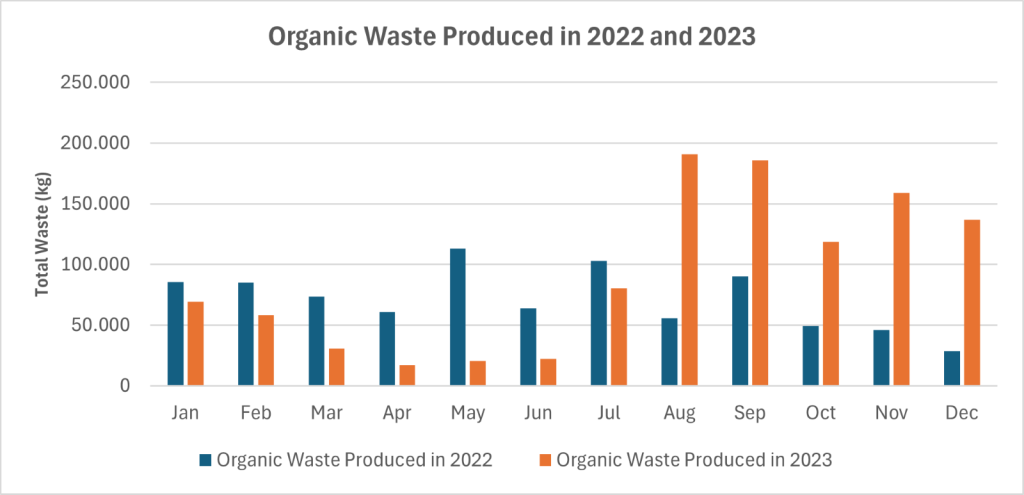UGM has implemented a systematic approach to track, measure, and manage food waste. This is an essential step in minimising waste and promoting sustainable food practices within its campus community.
As a basic practice, UGM operates according to . This procedure highlights the university’s commitment to a structured approach to waste disposal, which includes quantifying food waste. Systematic evaluation of food waste plays a key role in these efforts, enabling UGM to assess the amount of food discarded and identify opportunities for further waste reduction. Monitoring food waste quantities also strengthens the university’s broader waste management goals, promoting responsible consumption and sustainable campus practices.
In 2023, UGM’s Directorate of Assets issued Circular Letter Number 8846/UN1.P.V/Dit.Aset/TR.01.02.2023 About Waste Management provides detailed guidelines for organic waste management, including food waste, within the university. This directive schedules organic waste collection from Monday to Saturday, between 6:30 and 10:30 a.m., facilitating regular monitoring and measurement of waste quantities. By tracking the origins and amounts of organic waste, including food leftovers, UGM ensures accountability at the unit level. This structured waste tracking method aids in accurate measurement and creates a streamlined process for identifying departments or units generating significant waste. Such accountability encourages departments to optimise food handling and disposal practices.
Further supporting these initiatives, UGM’s Rector’s Office issued an additional regulation (Circular Letter Number 9034/UN1.P/OT.01.03/2024 About Waste Management). This regulation mandates all university units to comply with campus waste management policies, reinforcing the necessity of food waste tracking within UGM’s sustainability framework. Through these policies, UGM emphasises the importance of minimising waste generation at its source. These steps contribute to a cultural shift within the university, which fosters awareness among faculty, staff, and students about responsible waste disposal practices and promotes sustainable resource use.
Organic waste typically includes biodegradable materials like food scraps, yard waste, and other natural waste products. The figure below shows the quantity of organic waste generated and treated by Universitas Gadjah Mada in the years 2022 and 2023. This is the result of the tracking and measuring process. A comparison of waste production between 2022 and 2023 shows an increase of about 33.88%, driven by the large-scale activities organised by UGM. The overall population has also increased to 10,7% from the previous year. There are additional study programs at any level for undergraduates and postgraduate students. There are 91 additional study programs divided into 70 programs at the undergraduate level and 21 programs at the Bachelor of Applied Sciences. The total organic waste produced hit the highest percentage from August to December 2023, when most of the university’s big events are hosted. Some local agendas have increased food waste, such as Nitilaku 2023 in December. Nitilaku, initially a cultural parade symbolising Gadjah Mada’s establishment, has evolved into a collaborative cultural spectacle that celebrates the contribution of alumni, communities, the private sector, and the government.

UGM ensures a campus-wide commitment to its sustainability goals by engaging individual faculties in waste tracking. Waste is sorted in each faculty and working unit and then consolidated at the cluster waste depot for record-keeping by staff. The Directorate of Assets records the volume of waste based on these cluster depots, ensuring alignment between the faculty and asset directorate records. UGM’s Graduate School has actively implemented these waste management guidelines through a Circular Letter from the Postgraduate School on Waste Management as part of the university’s multi-faculty collaboration in sustainability practices. This school-level initiative highlights the effective adoption of UGM’s waste management policies within individual faculties, demonstrating how university-wide policies can be integrated into specific departmental operations.
Universitas Gadjah Mada has seven years and counting, a waste management procedure that involves waste segregation groupings. Most of the waste from each faculty is directed to the UGM Waste Processing Laboratory, commonly called Rindu (Recycling et al. at the Agro Technology Innovation Center), located at PIAT in Kalitirto, Berbah Sleman. Approximately 6.08% of this increased organic waste is fully processed at PIAT. The organic waste management procedure includes the processing of food waste through organic waste bioconversion using black soldier fly maggots (PIAT – Maggot Bioconversion), offering a dual benefit by simultaneously producing both feed and fertiliser. These larvae are exceptionally efficient in digesting organic waste, including food scraps and animal waste, and rapidly converting it into their own biomass. The adult black soldier fly larvae can be harvested for use as feed in the aquaculture and poultry industries, while the residual byproduct of the digestion process can be utilised as valuable fertiliser. This innovative approach not only addresses waste reduction but also contributes to sustainable resource management in agriculture and animal farming.
The reproduction of maggots at PIAT increased significantly when they were provided with food waste from RSA (Academic Hospital UGM). RSA stands out as an ideal source of food waste for maggots due to the high nutritional content present in the food provided, catering not only to the patients but also to the maggots. RSA consistently supplies substantial food waste, allowing maggots to proliferate in large numbers and sizes. This abundance of nutritious food waste from RSA has proven to be conducive to the thriving reproduction of maggots at PIAT.
UGM’s food waste tracking and management efforts reflect a proactive stance on waste reduction and sustainability. With standardised disposal procedures, scheduled organic waste collection, and faculty-wide compliance, UGM is fostering responsible consumption and environmental stewardship. These actions align with SDG 2, positioning UGM as a model for institutions aiming to reduce food waste and support sustainable development.
References :
